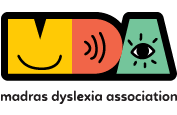
Accommodations for Individuals with Specific Learning Disability for GRE
Concessions & Accomodation Services offered by MDA
By By Komalavalli Parthasarathy-Special Educator, Madras Dyslexia Association
Educational Testing Service (ETS) provides accommodations for individuals with Specific Learning Disability (SLD) to ensure they have equal opportunities. These accommodations are based on documented evidence of the disability and its impact on test-taking.
- Available accommodations for individuals with SLD:
Extended testing time
- 50% Extra time (1.5x): Common for individuals with dyslexia, dysgraphia, or dyscalculia. Example: Verbal Section (Neurotypical 41 min)-> 62 min, Quantitative Section (Neurotypical 47min)->71 min, Analytical Writing (Neurotypical 60 min total)-> 120 min total
- 100% Extra time (2x): Granted in severe cases where processing speed is significantly affected. Example: Verbal Section (Neurotypical 41min)-> 82 min, Quantitative Section (Neurotypical 47min)->94 min, Analytical Writing (Neurotypical 60 min total)-> 120 min totalAdditional breaks
- Individuals get extra breaks between sections due to mental fatigue, for taking notes or for medication. Breaks do not count towards total testing time.
Paper-based test option
- Available for individuals who struggle with reading from a screen due to dyslexia or visual tracking issues. Reduces cognitive overload caused by digital text processing.
Screen reader and assistive technology
- Text to speech software (JAWS): Reads the content aloud for individuals with severe reading difficulties.
- Zoom Text (magnification software): Increases font size for better readability.
Large print test materials
- Available for individuals with visual processing difficulties linked to dyslexia.
Human reader and amanuensis
- Human reader: Reads the test aloud for individuals who have difficulty decoding words.
- Amanuensis (writing assistant): Writes responses for individuals with severe dysgraphia.
Use of scratch paper or graph paper
- Essential for individuals with dyscalculia to aid in mathematical problem solving.
Use of calculator
- Standard GRE: The test already includes an on-screen basic calculator for the Quantitative Section.
- Accommodations for dyscalculia: A physical calculator may be permitted if the individual has significant difficulty using an on-screen calculator due to dyscalculia or motor coordination issues. Four function calculator – addition, subtraction, multiplication, division – is allowed.
2. Eligibility criteria
- To qualify for accommodations, individuals must submit documentation demonstrating:
A formal diagnosis of SLD. - Evidence that the disability significantly impacts test performance.
- Proof of prior accommodations for school and college education.
3. Documentation requirements
- Individuals must submit a comprehensive psychoeducational or neuropsychological evaluation report, including:
Cognitive assessment: WAIS-IV, WISC-V or similar tests. - Achievement tests: Woodcock–Johnson, WIAT-III, or KTEA.
- Processing speed and memory tests: Trails making test, Digit Span.
- A statement to explain why accommodations are necessary for each test.
4. Important considerations
- Accommodations do not affect the test score or how results are reported.
- Approved accommodations are valid for multiple GRE attempts.
- Individuals cannot request accommodations on the day of the test. Approval must be obtained in advance.
